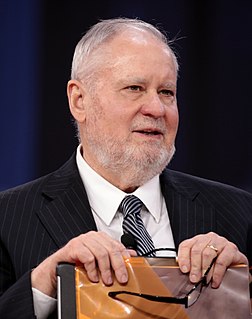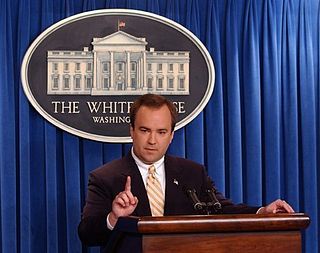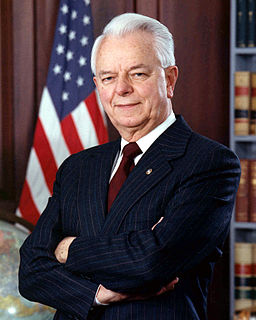A Quote by Ron Paul
Times of tragedy and war naturally bring out strong emotions... Sometimes people are only too anxious to sacrifice their constitutional liberties during a crisis, hoping to gain some measure of security. Yet nothing would please terrorists more than if we willingly gave up our cherished liberties because of their actions.
Related Quotes
Some members of Congress will claim that the federal government needs the power to monitor Americans in order to allow the government to operate more efficiently. I would remind my colleagues that, in a constitutional republic, the people are never asked to sacrifice their liberties to make the jobs of government officials easier.
There are people who are always going to try to engage in activity that is illegal and they're going to try to subvert surveillance. But everybody should not give up their liberties and rights to privacy because some people are going to [do that]. We shouldn't stop or limit our basic liberties because some people are going to engage in criminal activities.
Critics have stepped up their attacks on the President for authorizing the National Security Agency to listen to international communications of known al Qaeda members or affiliated terrorists during a time of war. The American people expect their leaders to stay a step ahead of the enemy, and the National Security Agency authorization is a critical tool in the War on Terror that saves lives and protects civil liberties at the same time.
The pacifist thinks that the alternative to war is peace; it is not. Sometimes the alternative is oppression. Sometimes certain God-given rights and liberties can be preserved only by resistance to that which would destroy them. And to defend certain basic God-given rights and liberties is not immoral but righteous.
This Administration also puts forward a false choice between the liberties we cherish and the security we demand... That means no more illegal wire-tapping of American citizens. No more national security letters to spy on citizens who are not suspected of a crime. No more tracking citizens who do nothing more than protest a misguided war. No more ignoring the law when it is inconvenient. That is not who we are.
If we're ignorant of the historical sacrifices that made our liberties possible, we will be less likely to make the sacrifices again so that those liberties are preserved for future generations. And, if we're ignorant, we won't even know when government infringes on our liberties. Moreover, we'll happily cast our votes for those who'd destroy our liberties.
My countrymen, I have given proofs that I am one most anxious for liberties for our country, and I am still desirous of them. But I place as a prior condition the education of the people, that by means of instruction and industry our country may have an individuality of its own and make itself worthy of these liberties.
All of us in this country give lip service to the ideals set forth in the Bill of Rights and emphasized by every additional amendment, and yet when war is stirring in the world, many of us are ready to curtail our civil liberties. We do not stop to think that curtailing these liberties may in the end bring us a greater danger than the danger we are trying to avert.
Particularly when the war power is invoked to do things to the liberties of people, or to their property or economy that only indirectly affect conduct of the war and do not relate to the engagement of the war itself, the constitutional basis should be scrutinized with care. ... I would not be willing to hold that war powers may be indefinitely prolonged merely by keeping legally alive a state of war that had in fact ended. I cannot accept the argument that war powers last as long as the effects and consequences of war for if so they are permanent -- as permanent as the war debts.































